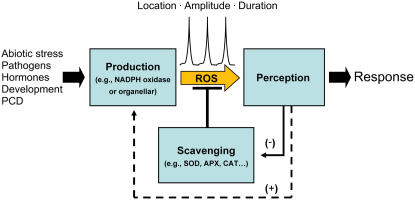Figure 1.
ROS form in plant cells as a consequence of myriad stimuli ranging from abiotic and biotic stress, production of hormonal regulators, as well as cell processes such as polar growth and programmed cell death (PCD). These reactive molecules are generated at a number of cellular sites, including mitochondria, chloroplasts, peroxisomes, and at the extracellular side of the plasma membrane. ROS trigger signal transduction events, such as mitogen-activated protein kinase cascades, eliciting specific cellular responses. The influence of these molecules on cellular processes is mediated by both the perpetuation of their production and their amelioration by scavenging enzymes such as superoxide dismutase (SOD), ascorbate peroxidase (APX), and catalase (CAT). The location, amplitude, and duration of production of these molecules determine the specificity of the rapid responses they direct.

